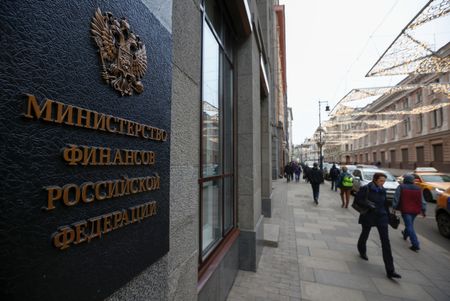MOSCOW (Reuters) – Russia said on Wednesday it would boost its sales of Chinese yuan by 17% from Feb. 7 in a move seen as aimed at supporting the rouble in the face of increased volatility due to Western sanctions and turbulence in the global forex market.
Under a complex scheme of foreign currency operations, the central bank buys and sells forex both to ensure supply on the domestic market and to act on behalf of the finance ministry, which runs the “rainy day” National Wealth Fund (NWF).
The finance ministry said it would cut its purchases of foreign currency and gold in the month ahead, a move that will increase the state’s overall forex sales, providing support for the rouble.
The finance ministry said its purchases of foreign currencies and gold for the period from Feb. 7 to March 6 would amount to the equivalent of 66.5 billion roubles, or 3.3 billion roubles a day.
In the previous period the purchases amounted to the equivalent of 70.2 billion roubles, or 4.1 billion roubles a day.
The move implied that the overall net forex sales by the government and the central bank will rise to 5.56 billion roubles per day from Feb. 7 from 4.76 billion roubles previously.
The central bank cannot buy and sell dollars and euros because of Western sanctions imposed over Russia’s actions in Ukraine. China’s yuan, which is now the most traded foreign currency in Russia, has become the regulator’s only instrument for forex interventions.
At 0930 GMT, the rouble was up 2.2% at 98.50 against the dollar, according to data from the over-the-counter market. It strengthened 0.13% to 13.27 against China’s yuan in trading on the Moscow Stock Exchange (MOEX).
The rouble has already surged 13% against the dollar this year due to lower demand from Russian importers during the New Year holiday season and despite new Western sanctions, which targeted sales of oil, Russia’s main export commodity.
The central bank said on Feb. 4 that the rouble exchange rate remains volatile due to continued problems with cross-border payments with Russia’s trading partners and the shrinking current account surplus.
In a separate move, the central bank reduced the volume of its yuan swap operations by 50% to 5 billion yuan, as China’s Lunar New Year holiday ended and Russian banks can now replenish their yuan stocks.
(Reporting by Darya Korsunskaya and Elena Fabrichnaya; Writing by Gleb Bryanski; Editing by Alison Williams and Gareth Jones)











